The best skin care routine starts with figuring out what your skin type is. Sensitive skin is the most skin type that needs proper care as it’s prone to dryness, acne, and irritation. Establishing a good skin care routine for sensitive skin is essential as it helps keep skin calm and healthy.
It’s important to check any product’s ingredients before applying it to your face or body as you can’t just grab whatever product and use it.
Once you know what your skin type is, 50% of the problem is solved as you will know which skin-care products you should look for.
Also, you will need to avoid some products that can be harsh on your skin.
To spare you a lot of time, I will cover in this article how to know if you have sensitive skin, what you should do if your skin is sensitive, and the top tips for a suitable skin care routine for sensitive skin.
Table of Contents
How Do I know If I Have Sensitive Skin?
As you might know, having sensitive skin is genetic so you can go ahead and blame your mom and dad for having it!
An important study showed that it’s something that can be passed down from generation to generation.
So sensitive skin is caused by genes, not environmental conditions.
According to another study, nearly 70% of women believe that they have sensitive skin.
Now the question is Do you have sensitive skin? Dermatologists would answer this question by saying there is no checklist to determine if you have sensitive skin.
But there are some signs that can help you know what your skin type is.
People who have sensitive skin usually have subjective complaints that are not related to objective clinical findings.
They often suffer from severe facial irritation, dryness, burning, and tightness. They also experience a stinging reaction after applying some skincare products like sunscreens or cleansers to their skin.
Furthermore, certain climatic conditions can worsen the case. The signs usually vary from one person to another.
Also, if you have sensitive skin, you may be allergic to specific ingredients that develop allergic reactions like itchy rash, redness, or irritation. Consulting a doctor is the best way to help you feel better.
Patients with sensitive skin typically develop some skin conditions like Rosacea, Psoriasis, or eczema.
Luckily, if you have sensitive skin, you can avoid the triggers, make some lifestyle changes, and follow a consistent skincare routine to keep everything under control.
I know you might think this is not possible but actually, as someone who has sensitive skin and Rosacea, I’m telling you, you can control everything.
It’s a bit challenging but you will figure it out, Don’t worry!
So if you think you experience any of those symptoms, visit a dermatologist to help you know more about your skin.
How To Choose The Right Skincare Products For Sensitive Skin?
If you have sensitive skin, you should know that not all skincare products would suit your skin.
You need to avoid certain formulas or ingredients to maintain skin health and reduce irritation.
You should always check the ingredients of any product before buying it. And also choose the products that are labeled as sensitive-skin-friendly.
Look out for those ingredients:
- Alcohol.
- Fragrance.
- Sulfates.
- Essential oils.
- Harsh exfoliants.
- Chemical sunscreens.
- Petroleum.
- Alpha Hydroxy Acid.
- Benzoyl Peroxide.
These ingredients can irritate the skin and cause skin flare-ups or skin rashes. Avoid using any product that has any of those ingredients if you wanna your skin to look healthy and clear.
A Good Step-By-Step Skin Care Routine For Sensitive Skin:
Having sensitive skin is a bit tricky but you can control it by building the right skin care routine for sensitive skin that can guarantee the best results.
Dermatologists usually say you should keep it simple when it comes to sensitive skin. The fewer products, the better.
So try the skincare routine I included below to rebalance your skin:
1- Cleanser
A good skincare routine starts with cleansing. It’s essential to remove built-up dirt, makeup, sunscreen, and all other impurities.
Use a gentle cleanser and rinse with lukewarm water and pat your face gently. Remember not to rub your skin as this can cause irritation.
Also, washing your face twice a day with a suitable cleanser keep the pores unclogged which helps reduce acne and leads to healthy-looking skin.
As for me, I use Avene Cold Cream Ultra-Rich Cleansing Bar in the morning when I wake up. At night before going to bed I cleanse my face with Bioderma Sensibio H2o Micellar Water then wash my skin with my Avene cleansing bar. The double-cleansing method is most recommended before going to bed to be sure your face is dirt, germ, and makeup-free.
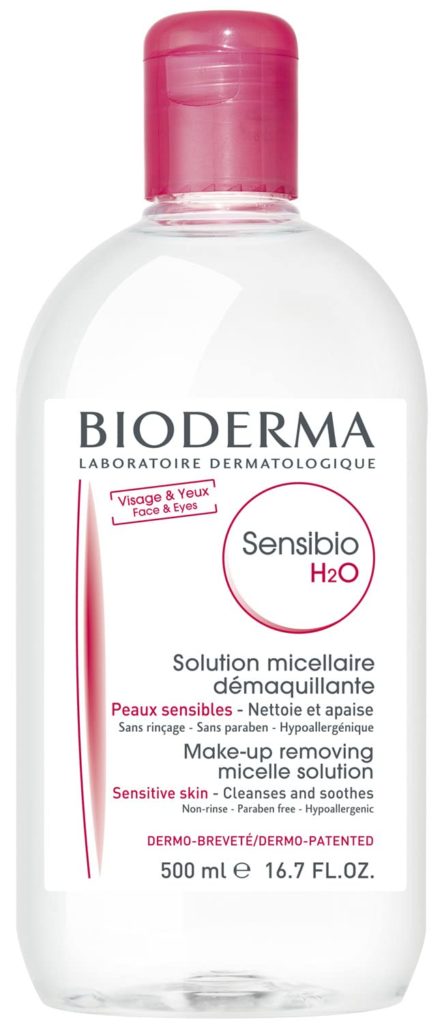
Related: The 10 Best Facial Wash For Sensitive Skin With Acne
2- Alcohol-Free Toner
After cleansing your face, apply non-alcohol-based toner to your skin to soothe it and restore its PH levels.
A toner can also reduce redness and inflammation and leave your skin soft and calm.
I love to use rose water or pure aloe vera as a toner, they have a great smell, hydrate my skin, clear up pores, and reduce flare-ups.
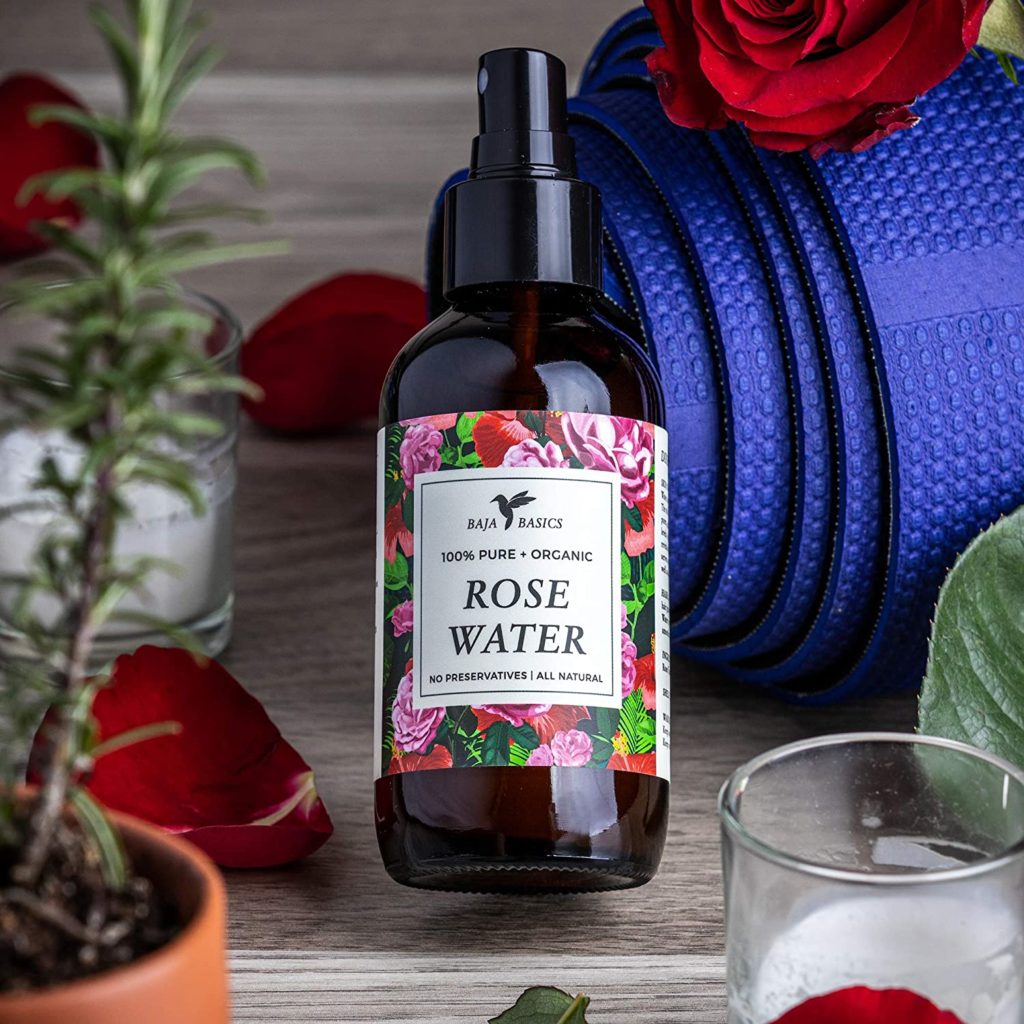
Related: Toner For Sensitive Skin: The Best 11 Non-Irritating Picks
3- Serum
Adding a serum to your skincare routine can be a great idea. You can try it and see if it works for you.
Serums have some great benefits as they can reduce the appearance of fine lines, wrinkles, and dark spots.
And it aids in maintaining skin health. Many dermatologists recommend Vichy Minéral 89 Prebiotic, it’s a great serum that can accelerate skin barrier repair.
The Vichy Minéral 89 Prebiotic Vichy Concentrate Serum can reduce fine lines in 4 weeks and improve skin texture.
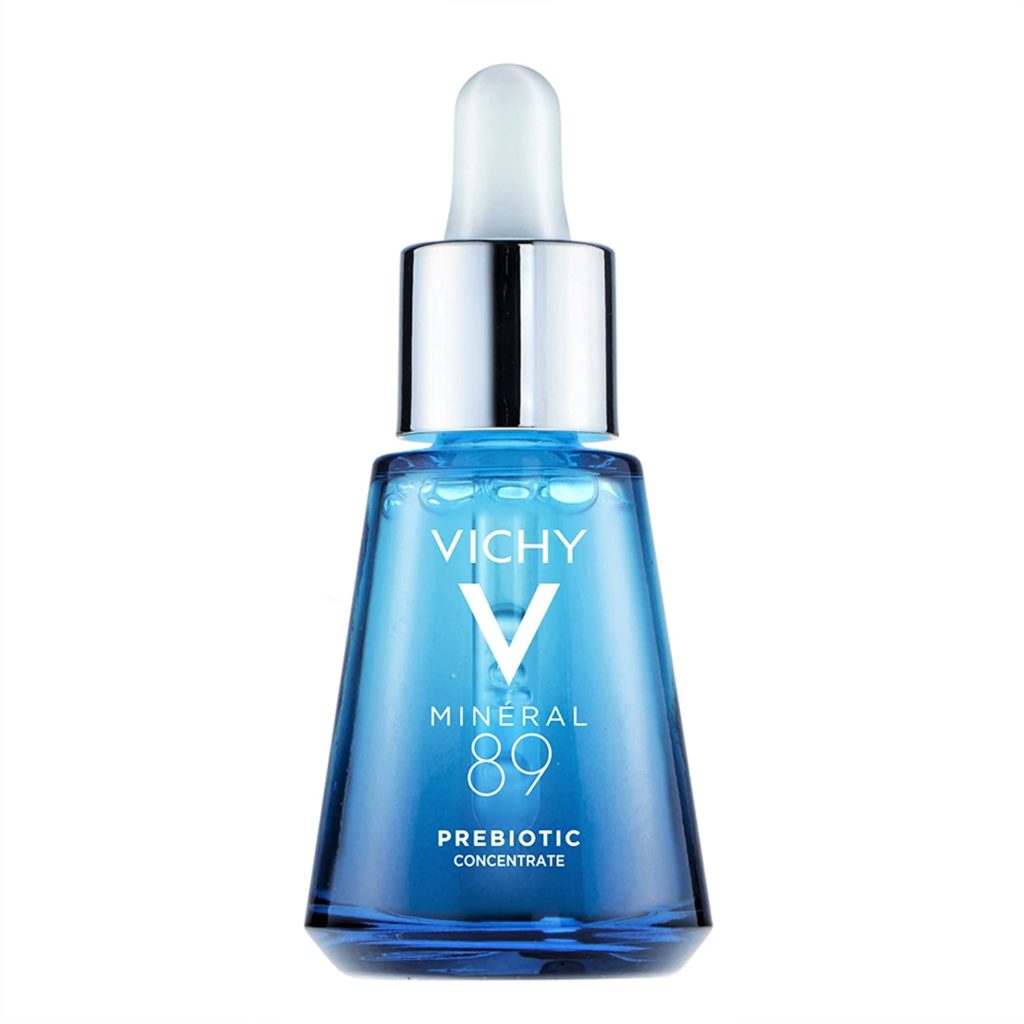
4- Spot Treatment
Breakouts appear when your pores become clogged and inflamed. Regular use of products that clarify pores can help prevent acne and keep skin clear.
I use Bioderma Sebium Global or Bioderma Sebium Pore Refiner daily as part of my morning and night routine.
My face was full of acne especially my chin when I started using it so my dermatologist recommend it to me.
After using it for a couple of months, It helps unclog pores and make my skin super clear and smooth. It’s a lifesaver!
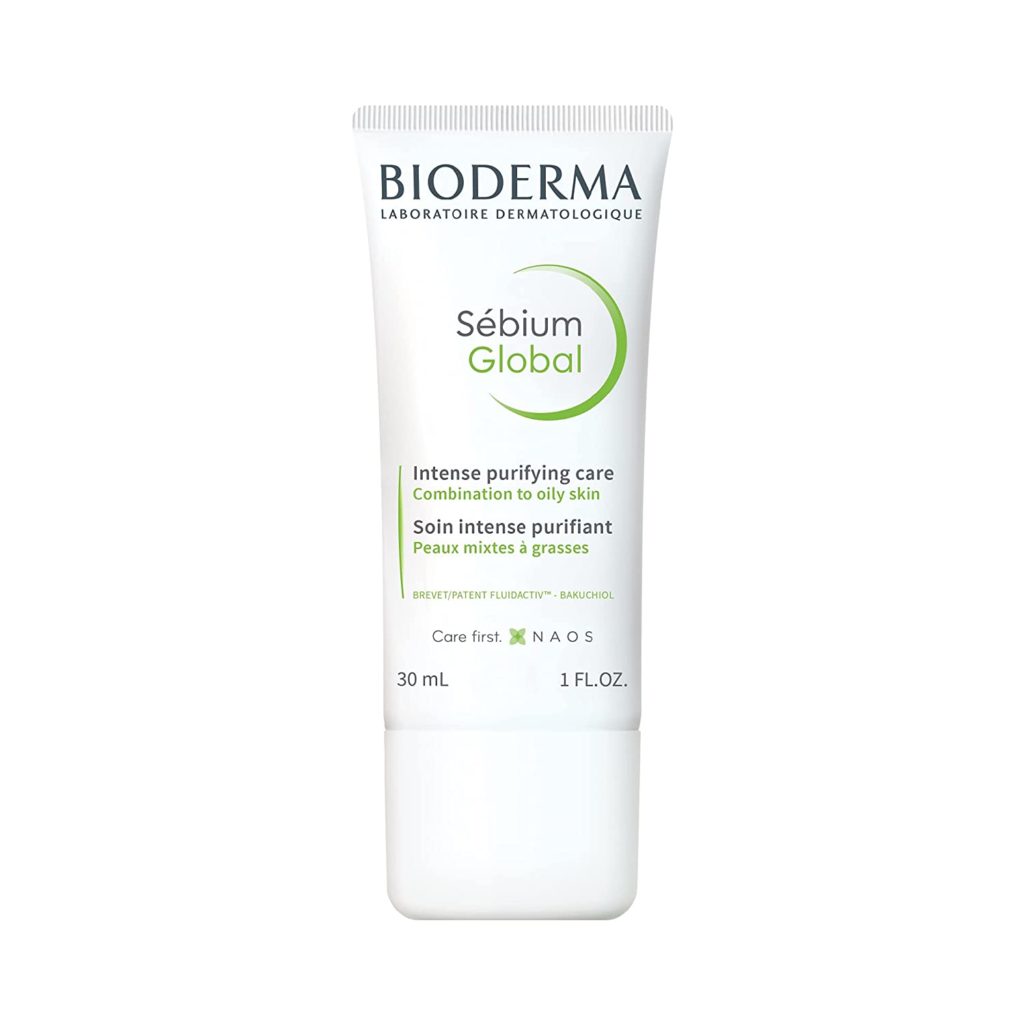
Find also Bioderma Sebium Pore Refiner on Amazon.
5- Moisturizer
Using a moisturizer daily is a must for all skin types especially sensitive skin as it needs extra moisture to support the skin barrier health.
Look for a moisturizer that contains soothing ingredients to keep your skin well-hydrated and decrease the appearance of tightening dry skin.
I apply Eau Thermale Avène Cicalfate+ Restorative Protective cream daily to help with flare-ups and skin dryness. It keeps my skin feeling soft and healthy
Also, it works great for me when I use it during certain climatic conditions like dusty or extremely hot days, it can help reduce irritation and redness successfully.
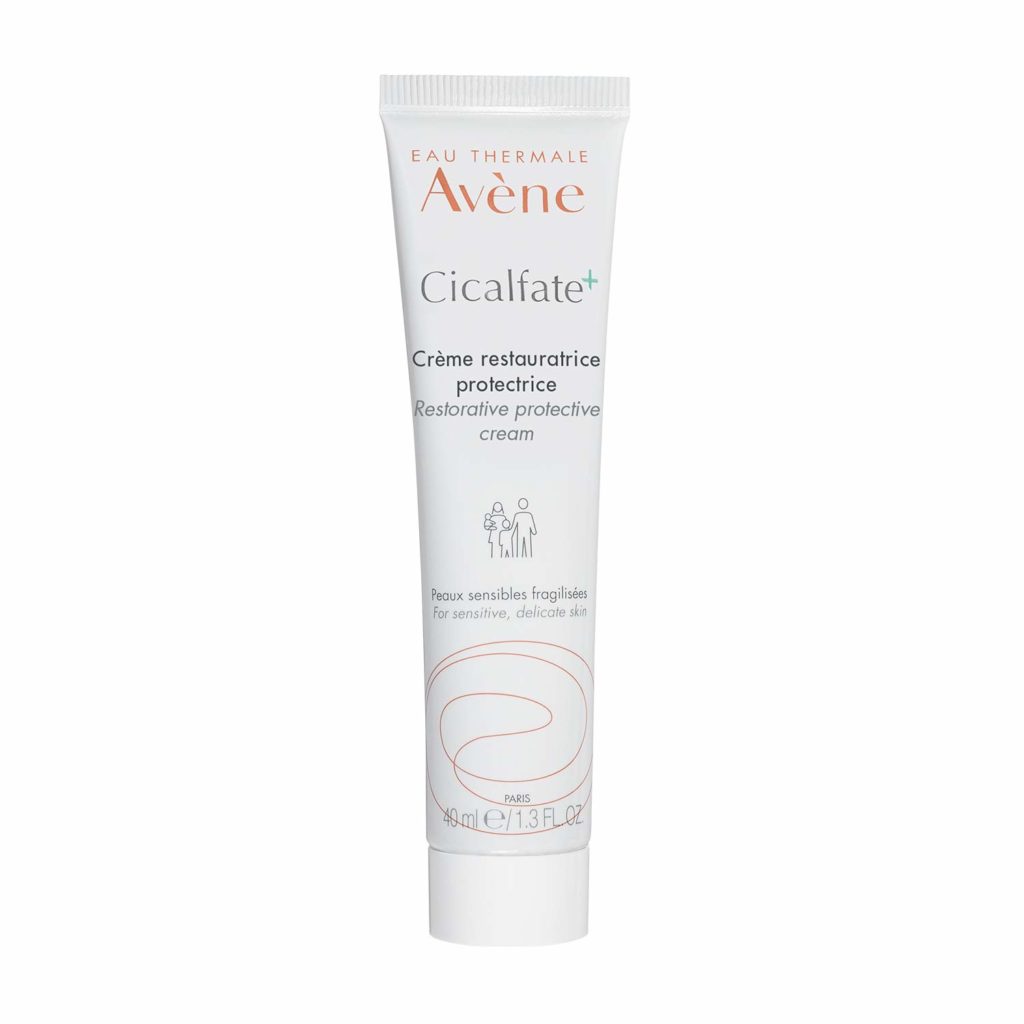
5- Exfoliator
Yes. You can exfoliate your sensitive skin too! But you have to use a gentle exfoliant to cleanse and reduce irregularities and redness.
You don’t wanna use a heavy exfoliant as it can cause serious issues to your sensitive skin. It can cause scarring, flare-ups, dryness, and stinging.
It’s best to exfoliate 1-2 times a week to get rid of dead skin cells, refine pores, remove blackheads and whiteheads, and lift away other impurities.
Looking for the best exfoliators for sensitive skin? Check out this article: Best Exfoliator For Sensitive Skin: Top 15 Picks
6- Facial Mask
You can also use certain face masks that are made especially for sensitive skin to soothe and nourish your face.
Sheet masks or face masks can diminish redness signs, cool the skin, and relieve dry skin. Use facial masks 1-2 times a week to maintain your skin health.
You can find on the market many face masks or sheet masks that contain soothing ingredients to help you feel better.
I found one for you, Eau Thermale Avene Soothing Sheet Mask, I haven’t tried it but many Amazon reviewers say it’s super hydrating and refreshing. They notice the difference immediately after using it.
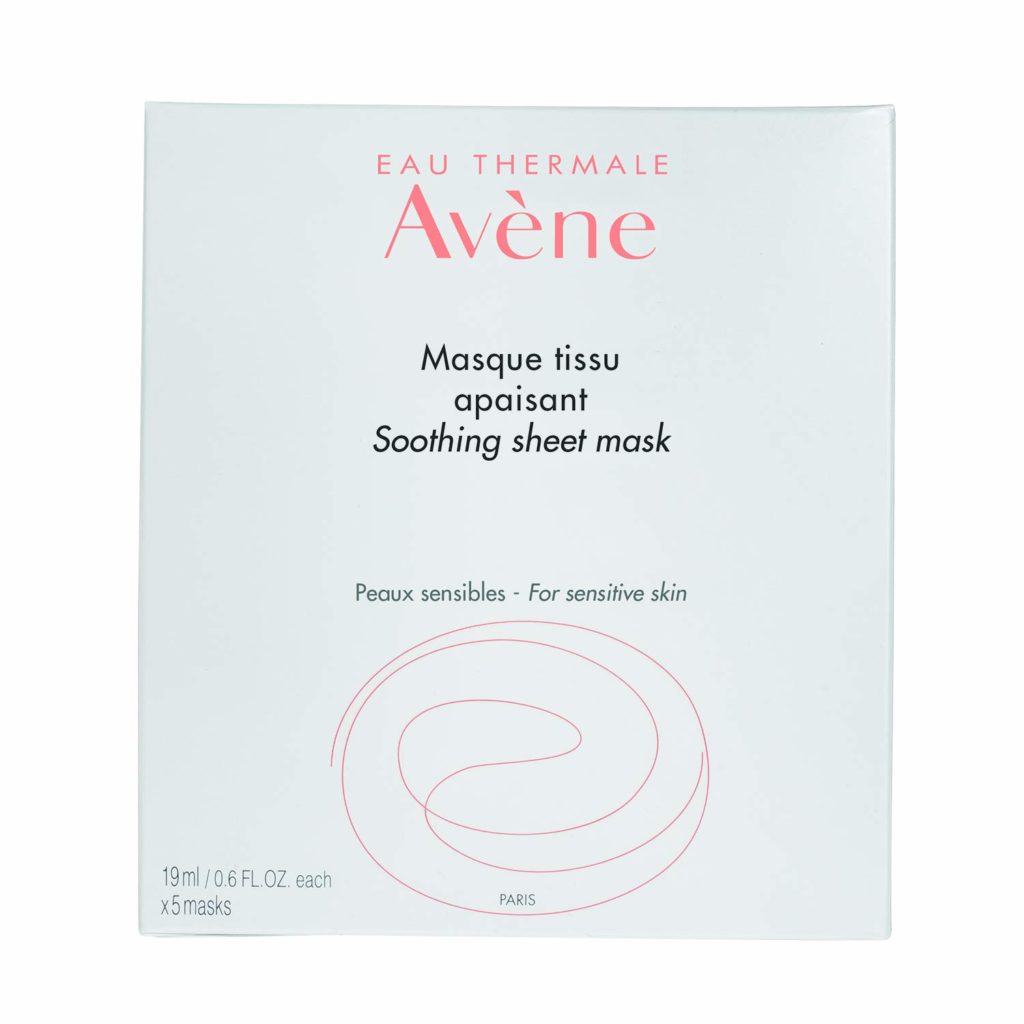
Related: The 16 Best Face Masks For Sensitive Skin & Buying Guide
7- Sunscreen
Sunscreens are one of the top products that every skin type needs to prevent skin damage. People with sensitive skin are super responsive to the sun’s rays. So it’s essential to wear sunscreen daily before exposure to sunlight.
The sunlight can cause serious issues like skin cancer, weaken skin barrier, skin damage, skin rash, and irritation.
About 9.500 people in the U.S. are diagnosed with skin cancer daily. It affects many people around the world too as they ignore using sunscreen.
It’s kinda hard to find the best sunscreen for sensitive skin as most sunscreens contain chemical UV blockers that irritate and burn the skin.
People with sensitive skin need a sunscreen that contains physical blockers like titanium oxide or zinc oxide as they pose a fewer risk for allergic reactions.
I use Ultrasun SPF50+ Extreme Protection for sensitive skin as my dermatologist recommend it to me and it works well.
It protects my skin against sun rays without causing burning or itching. Plus, it’s non-sticky, not too thick, and it makes my skin look amazing.
It can really protect extremely sensitive skin and you don’t have to re-apply it every two hours, you can re-apply after 5 hours depending on your skin type and sun intensity, Read the instructions before use.
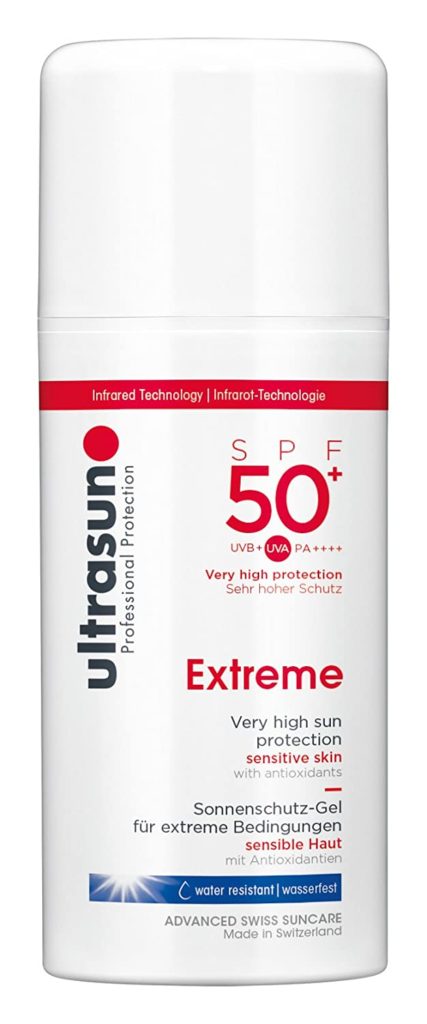
Advanced Tips For Sensitive Skin:
You should know how to deal with your sensitive skin and how to protect and moisturize it.
There are many helpful tips you can follow to maintain healthy-looking skin:
A. Skip Hot Long Showers
Hot showers can be a good idea, especially during chilly days but it’s not so great for sensitive skin.
Hot long showers can break down the skin’s lipid barrier and make your skin dry.
You should be careful not to put super hot water on your body or face.
Also, using harsh soaps to cleanse your skin can wash away the outer protective fatty layer.
Use lukewarm or warm water to take a shower and wash your body with a gentle body wash like Avene Cold Cream Ultra-Rich Cleansing Bar. It’s a good soap that hydrates the skin and it suits the body and face.
Related: The 12 Best Body Wash For Dry Sensitive Skin & Buying Guide
B. Avoid Harsh Chemicals
As I mentioned before, choosing the right products for your skin is super important. Harsh chemicals can cause serious damage to your sensitive skin.
So it’s recommended to choose natural skin-care products and read the ingredients before buying the product.
A product that contains moisturizing ingredients is the best thing you can do to your skin. They can improve skin complexion, reduce sensitive skin symptoms, and hydrate it.
There are many skin care products that contain good ingredients for sensitive skin. You can use those products as part of your skincare routine for acne-prone sensitive skin or dry sensitive skin.
Dermatologists recommend some ingredients that have anti-inflammatory and antioxidant properties to support the skin barrier like:
- Vitamin E.
- Aloe Vera.
- Shea Butter.
- Chamomile Extract.
- Hyaluronic Acid.
- Coconut Oil.
- White Tea Extract.
- Green Tea Leaf Extract.
- Sunflower Oil.
C. Do A Patch Test
Always do a patch test before adding a new product to your skincare routine.
To do the test, apply the product on a small patch of your skin like a forearm or under your ear then wait for 24 hours.
If you haven’t experienced any signs of allergy reaction then it’s safe to use this product.
D. Avoid Triggers
Triggers include environmental conditions, diet, and lifestyle habits can definitely cause your skin to react. To manage your sensitive skin, you’ll need to know your triggers and avoid them.
There are no specific triggers for sensitive skin as they vary from one person to another but the most common ones include:
- Pollution.
- Stress.
- Dehydration.
- Seasonal changes.
- Dust.
- Lack of sleep.
- Spicy food.
- Hot food.
The key here is to identify every factor that can irritate your skin and avoid them to keep your skin’s health intact.
E. Moisturize Your Body
Moisturising is not meant to be for the face only as your body needs moisture too to maintain a healthy lipid barrier.
I moisturize my skin after taking a shower and before going to bed. Also, in the winter my skin tends to irritate easily so I moisturize my skin day and night to prevent potential symptoms.
This helps lock in moisture, replenish your skin’s outer layer, and prevent dehydration.
There are many moisturizers that you can look for in the market for sensitive skin to give your skin what it really needs.
I love to use La Roche-Posay Lipikar Balm AP+ Body Lotion with Shea Butter to help keep my skin nourished and maintain its health. It never fails me as it makes my super sensitive skin feel and look healthy.
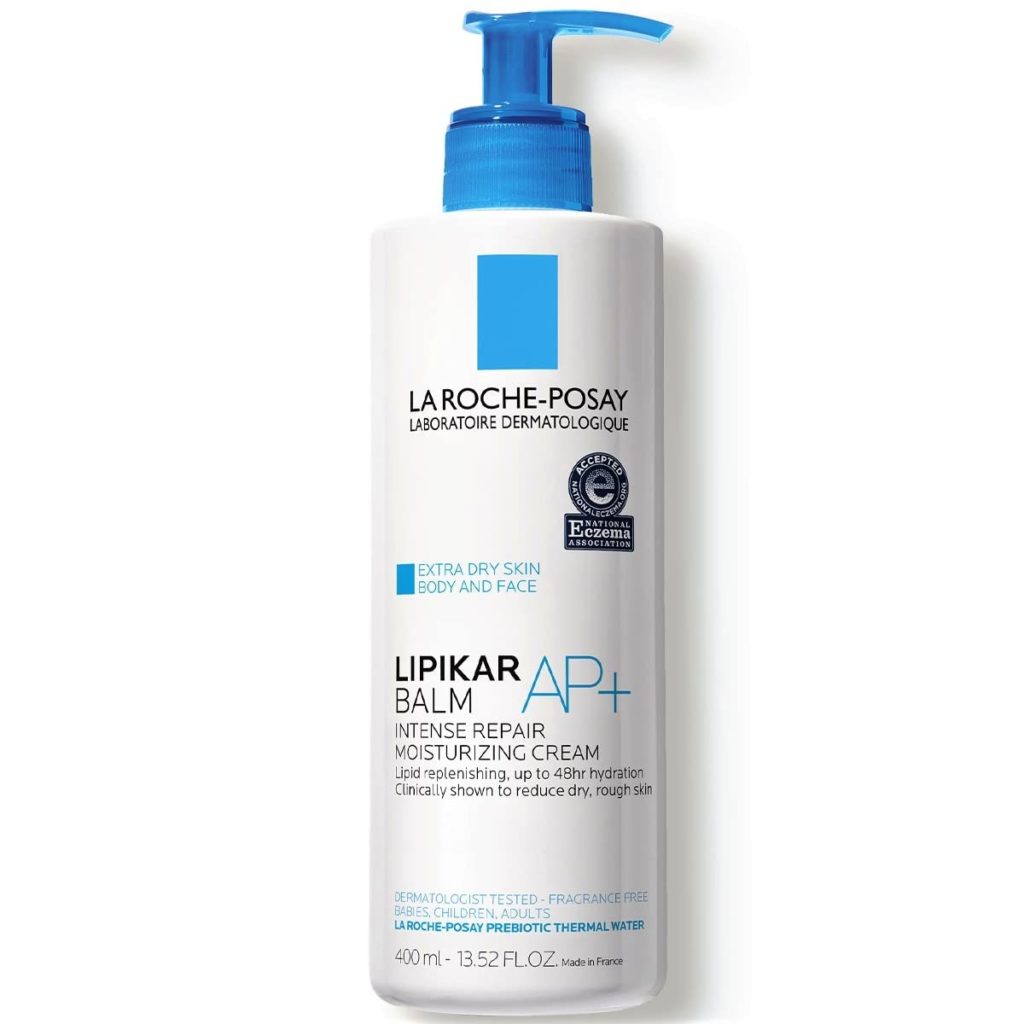
F. Keep It Simple
My dermatologist always tells me to keep my sensitive skin care routine simple and use as few products as possible.
A gentle cleanser, moisturizer, exfoliant, and sunscreen are the best skin care routine for sensitive skin.
Those can be enough and help you get the best results but if you wanna add a new product to your routine, remember to do a patch test first to avoid any issues.
The Bottom Line
It’s not easy to find the best skin care routine for sensitive skin, you may try many products until you find what suits your skin the most.
For me, it’s been a long journey until I found what I need. I tried some products my dermatologist recommend and some I just found online.
So you can go ahead and try the products I included if your skin is sensitive. I recommend performing a patch test and asking your dermatologist first to be sure everything will be okay.
* Hey Gorgeous! The Nfrw is reader-supported and I may earn commissions if you purchase products from retailers after clicking on a link from the site.
